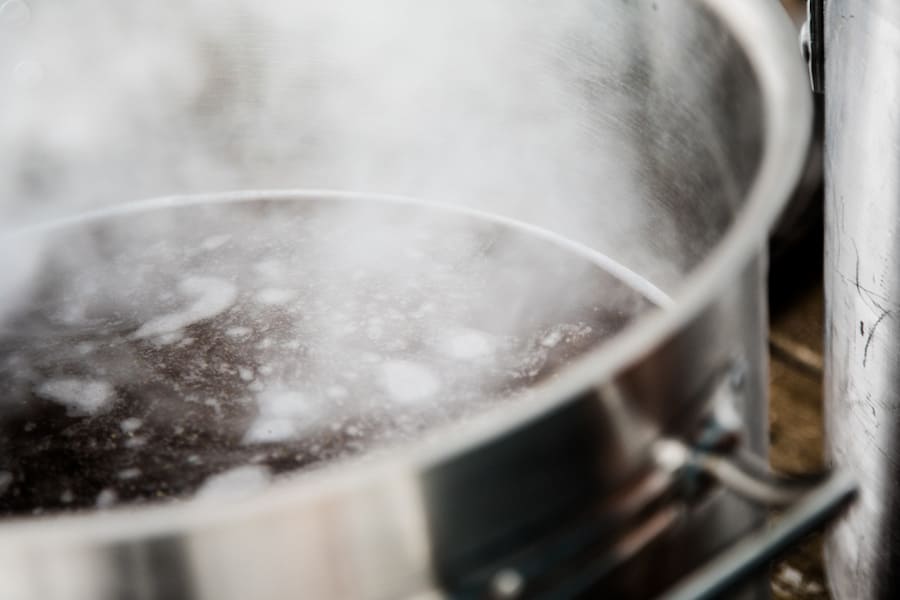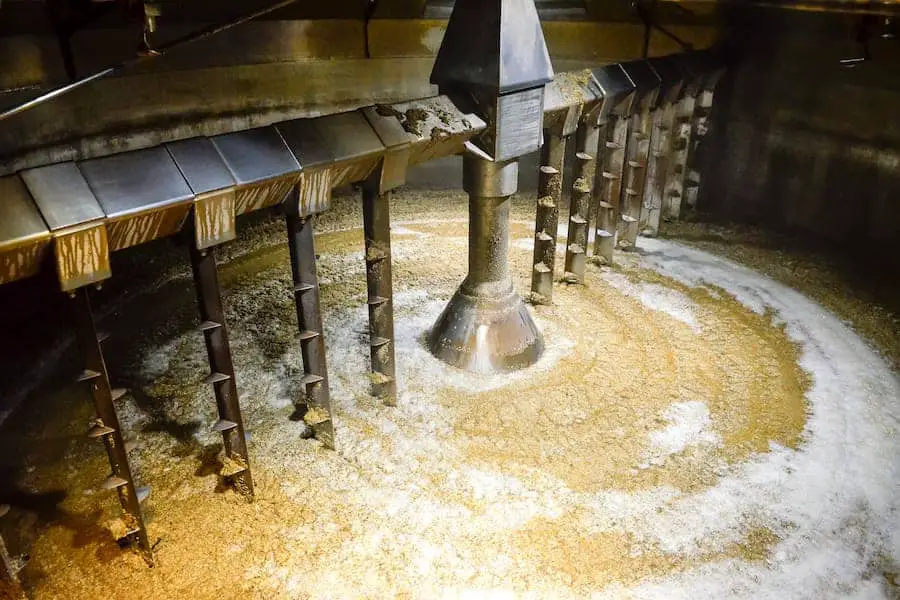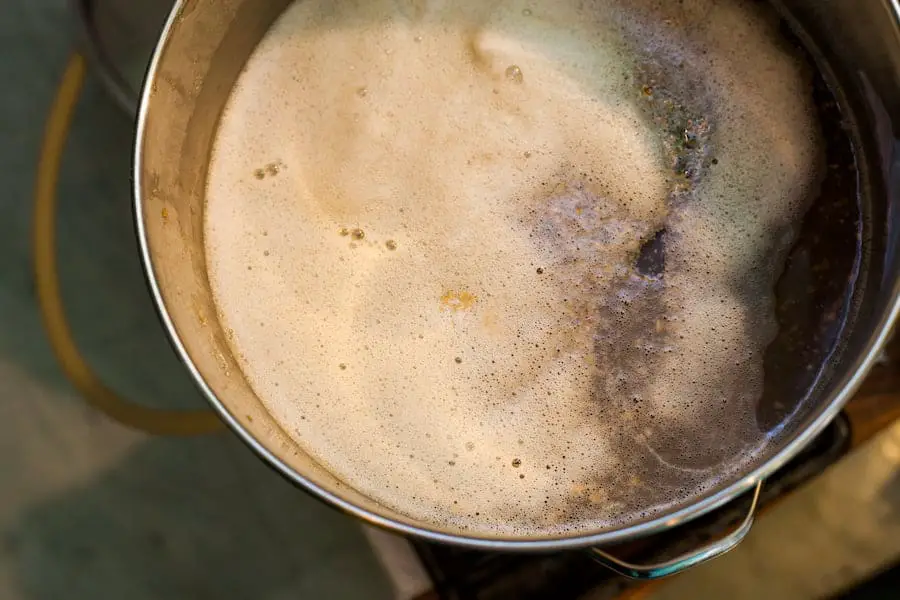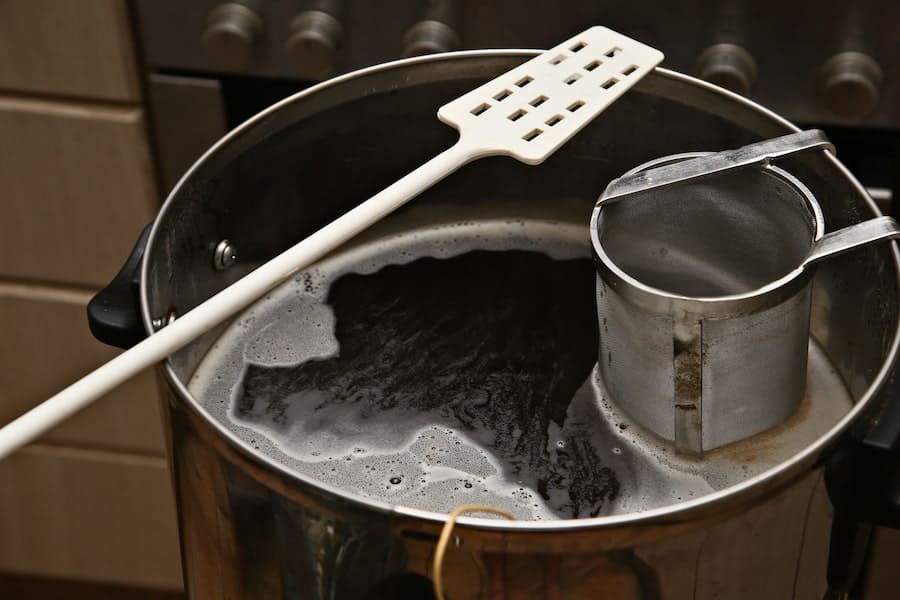If you buy something through a link in our posts, we may get a small share of the sale.
What is mash out? It is a question homebrewers may ask themselves from time to time, and it is a process that warrants some explanation. Many brewers consider mash out an important step in the brewing process, although its purpose is not universally agreed upon.
Contents
What Is Mash Out?
Mash out is a step in the brewing process used to stabilize the mash and improve the wort’s clarity. Brewers achieve this by raising the mash temperature to 170-180 Fahrenheit for 90 minutes before lautering. The elevated temperature helps to gelatinize the starch in the malt, making it easier to extract sugars during boiling.

Mash out is an essential step for all-grain brewers, who rely on the mash to convert the starch in the malt into sugar. Mash out helps stop the enzyme action that converts starch into sugar, leading to a stuck sparge and sweet wort, making lautering much easier.
On the other hand, the extract brewers may not find mash out to be quite as essential. This is because extract brewers rely on the malt extract that has already been converted to sugar. However, mash out is still a good idea for extract brewers, as it helps to improve the clarity of the wort and helps to reduce the risk of a stuck sparge.
Mash Out Methods
Mash out can be done in many ways, each with its own benefits and drawbacks. There are two common ways to do a mash out:
Using Hot Sparge Water
This option involves heating water to 190-195 F and adding it to the mash tun. This method is quick and easy, and it helps raise the mash temperature quickly. After this, you then add tap water to the tun to cool it down to the desired strike temperature (170 F) to keep the grain bed from becoming too hot.
You then proceed with the sparge as normal, and the hot water will help gelatinize the starch in the malt, making it easier to extract sugars. The wort’s density will also be increased, leading to a higher original gravity. However, this method can lead to a scorched grain bed if not done correctly.
Cooling the Mash With Sparge Water
This option involves raising the temperature above 170°F (76°C) and then quickly cooling the mash using tap water to a normal sparge temperature before collecting the sweet wort.
The cooling is done using tap water at about the same temperature as the mash. This method is often used when the brewer wants to make a high gravity beer and collect a little more wort than usual. It is the most efficient way to use all the grain in the mash.
If you are using this method, keep the following in mind:
- The malt should not be overheated, or it will start to break down and lose its flavor.
- The mash must be cooled quickly to prevent bacterial infection.
- The pH of the mash will drop as it is cooled, so you may need to add a little bit of acid to the sparge water.
- The wort will be a little cloudy because of the protein precipitate that forms as the mash is cooled.
- The beer will have a slightly more malt flavor than beers brewed with the infusion mash method.

When to Mash Out and the Process Involved
The best time to do a mash out is when you are finished boiling your beer. This will help to clarify the wort and remove any proteins that may have formed during the boiling process.
Your sparge water should also be at a boil before you begin the mash-out. This will help raise the mash temperature and ensure that all of the sugars have been extracted from the grains. If you are using a HERMS mash tun or RIMS system, you can begin the mash-out by heating your sparge water to the desired temperature (170-180 F).
Once the mash-out temperature has been reached, you can begin to sparge the grains. Be sure to sparge slowly and carefully to avoid extracting any tannins from the grain bed. The mash-out process should take around 10-15 minutes to complete.
Here is the summary of the steps involved in a mash-out:
- Raise the temperature of your sparge water to 170-180 F
- Add your sparge water to the mash tun
- Stir the grains and sparge water for 10-15 minutes
- Drain the wort from the mash tun
- Heat the wort to boiling temperature
- Add hops and continue the boil for 90 minutes
- Cool the wort and transfer to a fermenter
- Pitch the yeast and allow the beer to ferment for 7-10 days
- Bottle or keg the beer and carbonate
What Are the Benefits of Mash Out?
Brewing is fun and easy. However, there are a few things that you should know in order to make sure your beer turns out the way you want it. One of these is the mash out.
The mash out, simply put, is the final step in the all-grain brewing process. It is an essential step and one that should not be skipped.
So, what is the importance of mash out?
- It helps to clarify the wort. It also removes any proteins that may have formed during the boiling process. This is important because, if not removed, these proteins can cause the beer to be cloudy and off-flavored.
- It also helps raise the mash temperature and ensure that all sugars are extracted from the grains. This is especially important if you are using a HERMS mash tun or RIMS system.
- Finally, it helps stabilize the grains’ enzyme activity. This is important because it ensures that the conversion of starch to sugar is complete.

Mistakes to Avoid When You Mash Out
Mashing is good when you want to add body and sweetness to a beer. However, it can also lead to some common beer-making mistakes. The following are some tips and mistakes to avoid when mashing out:
- Check the temperature of your mash. Make sure that it is in the right range and that you are taking into account any changes in altitude or humidity that might affect the temperature.
- Do not let the mash get too hot. If it gets too hot, you will start to extract tannins from the malt, which will give your beer a harsh bitterness.
- Be careful when stirring the mash. Stirring too much can also cause the mash to get too hot.
- Make sure that your sparge water is at the right temperature. If it is too hot, it can extract tannins from the malt and affect your beer taste.
- Avoid using too much sparge water. If you use too much, you can dilute the beer and affect the flavor and color.
- Make sure that your boil kettle is big enough to hold all of the wort. If it isn’t, you will have to boil the wort in two batches, which can affect your beer’s flavor and color.
- Make sure that your wort chiller is big enough to cool the wort quickly. If it isn’t, the hot wort can cause bacterial infection.
Advantages of Mash Out
Mash out has a few advantages over not doing a mash out. The following are some of the benefits of mash out:
- It helps to stabilize the temperature of the mash.
- It helps to improve the clarity of the beer.
- It helps reduce the amount of foam produced during the boil.
- It helps to improve the flavor and color of the beer.
Disadvantages of Mash Out
There are a few disadvantages of mash out as well. The following are some of the drawbacks of mash out:
- It can lead to a reduction in the amount of fermentable sugars in the beer.
- It can cause tannins to be extracted from the malt, which can give the beer a harsh bitterness.
- It can reduce the head retention of the beer.

Frequently Asked Questions
What Is Sparging Water?
Sparging is the process of rinsing the grains in the mash tun with hot water in order to extract the residual sugars from the grains as much as possible. The amount of water used in sparging is 1.5 times the amount used in mashing. The hot water is called sparging water.
What Is a Mash Tun?
A mash tun is a vessel used for mashing. It can be made from a variety of materials, including Stainless steel, plastic, or copper. It has a false bottom that allows the wort to flow out while the grains remain in the mash tun.
What Is Beer Lautering?
Beer lautering is the process of separating the wort from the grains after mashing. The wort is drained from the mash tun and passed through a lauter tun filter to remove the grains. The grains are then rinsed with hot water to extract the residual sugars.
Conclusion
Mashing out is an essential step in the beer-making process and has many advantages. Knowing what mash out is and implementing it in your brewing process will help you make better beer free from potential problems. It will also help to improve the flavor and color of your beer.

